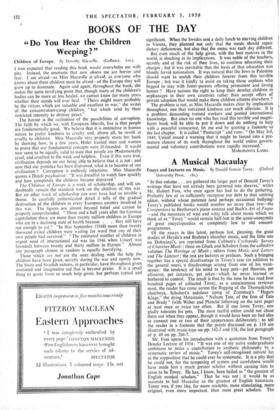BOOKS OF THE DAY
"Do You Hear the Children Weeping?"
Children of Europe. By Dorothy Macardle. (Gollancz. 2 is.) I HAD expected that reading this book would overwhelm me with pity. Instead, the emotions that now obsess me are horror and fear. I am afraid—as Miss Macardle is afraid, as everyone who knows about these children must be afraid—of the Europe they will grow up to dominate. Again and again, throughout the book, she makes the same terrifying point that, though many of the children's bodies can be more or less healed, we cannot know for many years whether their minds will ever heal. "Theirs might more probably be the virtues which are valuable and excellent in war," she writes of the concentration-camp children, "but which tend by their restricted intensity to destroy peace." The horror is the realisation of the possibilities of corruption. The faith by which we, with European liberals, live is that people are fundamentally good. We believe that it is instinctive in human nature to prefer kindness to cruelty and, above all, to revolt at cruelty to children. Miss Macardle very properly starts her book by showing how, in a few years, Hitler trained men and women to prove that our fundamental concepts were ill-founded. It would now seem to be equally valid to state that people are efindamentally cruel, and cruellest to the weak and helpless. Even if this were true, civilisation depends on our being able to believe that it is not ; and now that our pretence has been disproved, what is to become of our civilisation ? Corruption is endlessly infectious. Miss Macardle quotes a Dutch psychiatrist : "It was dreadful to watch how quickly and how completely the children became depraved."
The Children of Europe is a work of scholarship, and will un- doubtedly remain the standard work on the children of this war. But no other work of scholarship can ever have had so terrible a theme. In carefully authenticated detail it tells of the gradual destruction of the children in every European country involved in this war. The figures are almost beyond belief and cannot be properly comprehended. "Three and a half years after the German capitulation there are more than twenty million children in Europe who are in a declining state of health because . . . they still have not enough to eat." "In that September (1948)- more than twenty thousand exiled children were waiting for word that any of their own people had survived." "The estimated number of children in urgent need of international aid was (in 1946 when Unicef was founded) between twenty and thirty million in Europe." Almost any paragraph chosen at random is equally horrifying.
Those which are not are the ones dealing with the help the children have been given, secretly during the war and openly now. The Swiss and Swedish nations, in particular, have throughout given unstinted and imaginative aid that is beyond praise. It is a small thing to quote from so much help given, but perhaps typical and significant. When the Swedes sent a daily lunch to starving children in Vienna, they planned not only that the meals should repair dietary deficiencies, but also that the menu was each day different_ But even much of the help given, with the best motives in the world, is shocking in its implications. It was noble of the teachers, secretly and at the risk of their lives, to continue educating their charges ; but it was inevitable that the basis of that education was blindly fervid nationalism. It was natural that the Jews in Palestine should want to snatch their children forever from this terrible Europe ; but was it kindly to insist on taking those orphans who begged to stay with foster-parents offering permanent and loving homes ? Have nations the right to keep their derelict children in orphanages in their own countries rather than accept offers of private adoption that would make these children citizens elsewhere ?
The problem is not, as Miss Macardle makes clear by implication throughout, one that untrained kindness can much alleviate. It is a problem demanding trained workers and pooled international knowledge. But since no one who has read this terrible and magni- ficent book will be able to put it down and do nothing to help with a peaceful conscience, let me end by quoting a footnote to the last chapter. It is called "Postscript" and runs: "On May 3rd, 1949, Unicef issued a warning that it -might be forced into a pre- mature closure of its work throughout the world unless govern- mental and voluntary contributions were rapidly increased."
MARGHANITA LASKI.


































 Previous page
Previous page